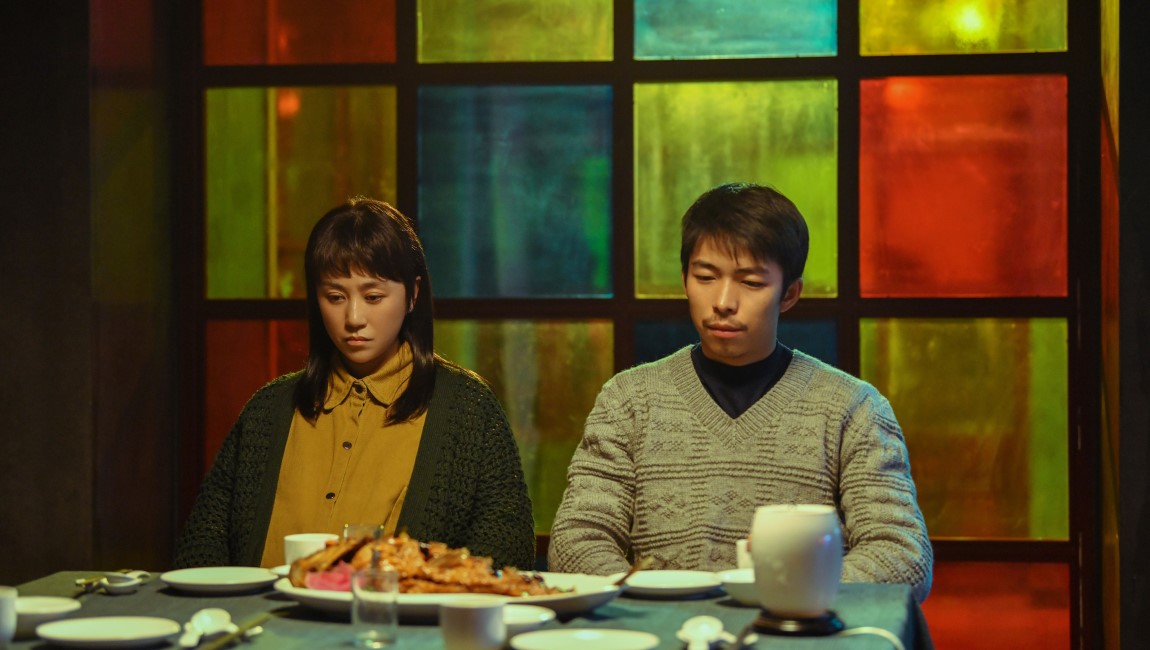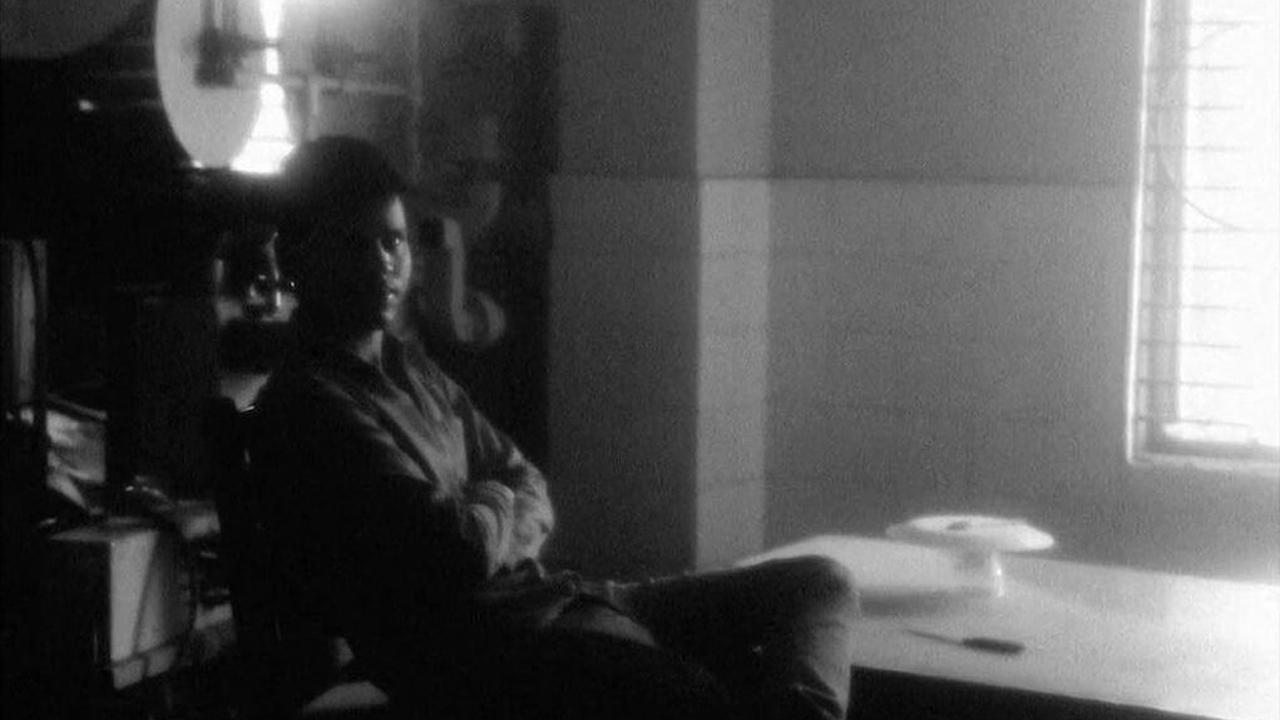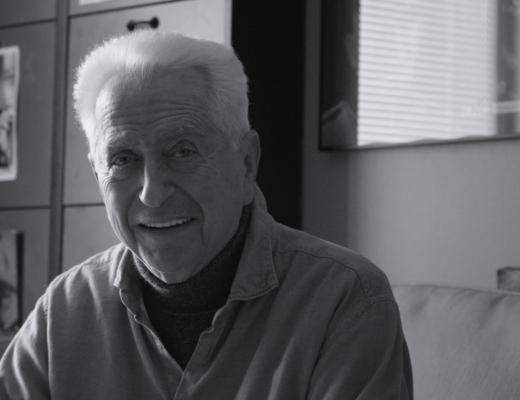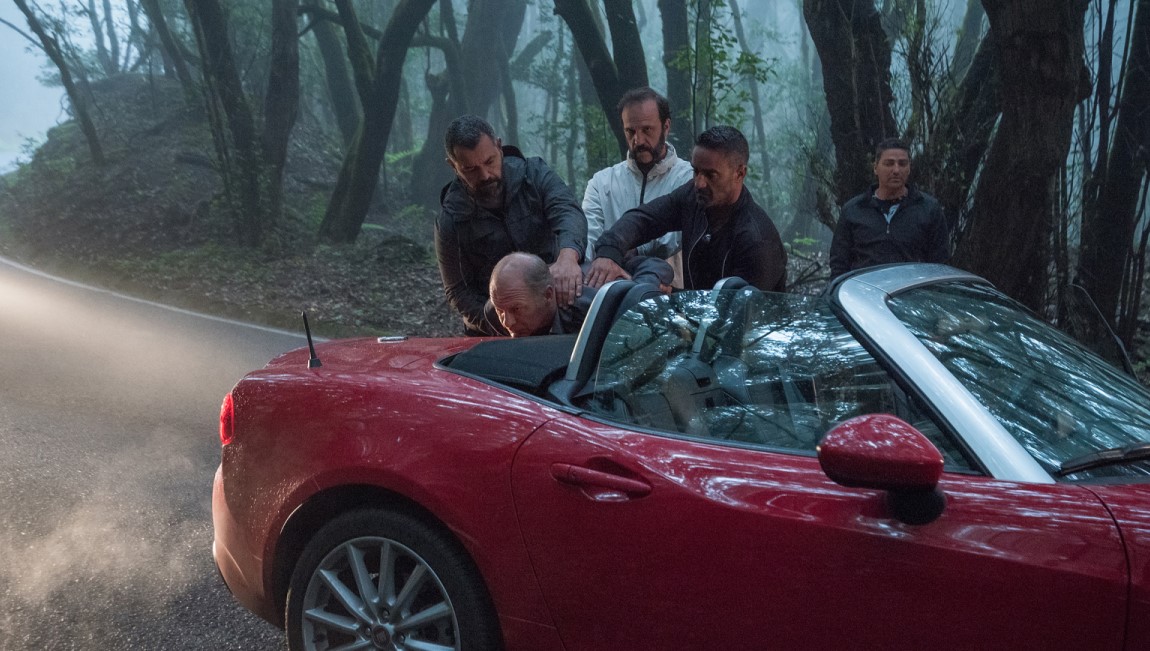Manchurian Tiger
There’s one very well-executed scene in mainland Chinese indie director Geng Jun’s Manchurian Tiger: Ma Qianli (Jun regular Zhang Zhiyong), a one-time-successful real estate mogul who’s now deep in debt, slumps back in his chair and solemnly smokes a cigarette as he plays voicemails from business partners who berate him over his poor finances. The camera pushes in on Ma slowly, until he looks up, seemingly breaks the fourth wall, and delivers a terse monologue: “Do you feel better after hearing this? Are you all going to sit here and listen all day?” After a brief pause, a reverse shot reveals that there’s a diegetic audience for Ma’s speech — a group of angry family members who, as we soon learn, have all sunk their savings into Ma’s latest, spectacularly failed business venture. Of course, the sequence, which pointedly arrives very early in the film, still resonates with the initial “meta implication” of Ma being a seeming conduit for Jun, his words prodding filmgoers about the passiveness of their viewership, and even maybe dinging the aestheticization of Jun’s favored slow-cinema style?
Manchurian Tiger runs almost two hours, though it doesn’t feel greatly more distended than Jun’s other films, even 2013’s just-52-minute The Hammer and Sickle Are Sleeping. That’s partly because the stories are very similar — bad luck, hard times, and freezing cold weather in Jun’s native Heilongjiang province — but also because there’s a constant friction at play between a seeming desire to depict the harsh physical and social realities of poor, rural life in the province and Jun’s always broad, stereotype-reliant approach to satire. One tends to wish, when subjected to the sluggish rhythms of a Jun film, that the director would either punch-up the action and embrace the genre elements that weave through his narratives (here, mobsters shaking down Ma for any coin he has left, as well as a procedural side-plot involving a woman investigating her husband’s extramarital affairs) or cast off the character quirks and plot contrivances that hamper attempts at capturing social realism in today’s poor, rural China. Neither change is likely, though, and that has as much to do with Jun’s own conception of contemporary Chinese arthouse filmmaking as it does the broader movement’s aesthetic preferences and — perhaps most of all — the political and economic conditions that shape it.
As with The Hammer and Sickle Are Sleeping and 2017’s Free and Easy, Jun favors a cross-cutting approach with Manchurian Tiger, introducing a series of plots unfolding around the same geography and gradually bringing those stories together through a series of unfortunate events. Ma’s recent financial woes are unknown to Xu Dong (Zhang Yu) when his pregnant wife, Meiling (Ma Li), forces him to sell the family dog, and so Xu trusts that Ma, unlike the scores of poor people in their village, will look after the animal instead of eating him. Meanwhile, Meiling discovers a dyed hair on her chronically unfaithful husband’s clothes and takes to the streets to interrogate the various women whom Xu has had affairs with in the past. Both Xu and Meiling eventually find themselves on parallel paths to revenge, and no one makes out well by the end. The message here is in the title: all parties act like caged tigers, their social and economic status the bars keeping them trapped in mundane lives. This miserablism is cut with satire, black comedy, and several more, diminishingly effective fourth wall breaks. The filmmaking is never inelegant, but rather inert, and the writing tends to handicap any attempt at nuance.
Indie cinema surfaced in China in the 1990s, seemingly born out of an urgent desire to document the rapidly changing social reality of the country in the decades after opening and reform — films were made not just by graduates of the famed Beijing Film Academy, as was generally the case with past generations of Chinese cinema, but by visual artists of other disciplines experimenting with the medium, especially as access to cameras and equipment expanded. Regardless of their pedigree, the filmmakers of this period tended not to be exposed to broader trends in a global arthouse cinema; they developed aesthetics based on a combination of the limited exposure they had to bootleg media, what was shown domestically in theaters, and, for some, what their college professors were able to screen for them. A combination of the strictures of access and the still-developing guidelines of censorship created the conditions for an innovative, bold form of independent filmmaking that peaked in the early 2000s, just before both of these crucial contexts underwent big changes: Laws governing indie film were firmed up by PRC leadership, and the advent of the Internet allowed an ever-increasing range of access to all kinds of cinema, both classic and contemporary. The filmmakers whose careers began after this period — and Jun Geng debuted right around the start of it — both understand the global arthouse culture they’re aiming for and are ever-aware of the threat of censorship, not just to their artistry but to the financial commitment of their producers.
To a certain extent, this is another sign of homogenization — Chinese filmmakers being subjected to the same intense financial obligations and considerations that mar the production of arthouse films in even the biggest markets in the world right now. But the pressures of censorship are a more unique facet of this paradigm. For a Chinese “indie” film (the exact definition of these productions is complicated and often involves trans-national funding) to earn backing, usually, first the script has to pass muster with censors, but even that is no guarantee that the film itself will do the same — and the longer the need for recuts and for re-submitting films, the more expense to the producers, and the more that dings the filmmakers’ relationships with them. The result of this has been a kind of stunted growth in mainland Chinese independent film — which is where we return to Jun Geng, who seems like an appropriate poster child for that development. An adept filmmaker on a formal level, Jun filters the influence of the Coen Brothers’ dark comedy through a distinctly Chinese cultural perspective. But Manchurian Tiger, much like Jun’s others, demonstrates a reticence to be subversive, trading the bite of satire for a more essentializing portrait of rural life — one that retreats from the vanguard of Chinese indie cinema and instead strikingly resembles the messaging of its State-sponsored counterpart.
Writer: Sam C. Mac
Virgin Blue
It’s perhaps become a moot point to invoke the shadow of Apichatpong Weerasethakul when talking about an emerging festival filmmaker’s work in the 21st century. Few directors have been as quietly but markedly influential as the Thai master, as his interweaving of the mundane and the ethereal is able to be harnessed in a vast array of styles and narratives. But it feels especially apropos when considering Niu Xiaoyu’s lovely feature debut Virgin Blue, which builds a whole solar system out of its simple premise: Yezi, a recent college graduate, goes home for the summer to visit her grandmother who raised her.
During the course of this stay, uneventful in “realistic” terms, the apartment that much of Virgin Blue takes place in seems to mutate and expand. As befits the semi-constant state of napping or sleep that Yezi and her grandmother occupy, this is a somnambulant film, filled with interludes explained partially by the onset of the grandmother’s dementia, partially by the memories that both women have together, and even more so by the supernatural figures that flit in and out, most notably Yezi’s grandfather, whose spirit is said to be visiting for a few days.
Early on, in a series of mistakes regarding the year, the grandmother balefully notes that she “always thinks it’s 2020,” and while the film appears to actually take place in that year — albeit without masks or apparent signs of the pandemic — that painfully apt sentiment says a great deal about the dislocation that the film revels in. Indeed, this floating quality is Apichatpong’s territory: fantastical musical interludes, nocturnal conversations with spirits; the film even ends with a similar gesture as Syndromes and a Century, though it lacks that film’s narrative precision.
But what truly distinguishes the film is its extravagant play with light and its moderate metafictional elements. There are moments inside the apartment where space and time seem transfixed, as the film’s subtly dynamic sound design comes to the fore and rays of light dance across the room, alighting on objects and clocks that seem to suddenly gain a new vitality as the camera patiently moves along with it. As much as the explicit occurrences of surreal intervention, these moments enhance the already serene quality of Niu’s largely locked-down frames, often playing out in long takes.
The ruptures alongside these scenes lead to one of Virgin Blue’s most fascinating qualities. At one point in the film, Yezi moves a sliding glass door that reveals a film crew; she turns around, only for the people to have vanished. Later on, the grandmother’s actress seems to have a conversation with an offscreen Niu, complaining about the confusion of filming as crew members and cameras are seen in the far background. These, along with other puncturing scenes, seem to get to the heart of Virgin Blue’s mystery and beauty: it’s a film open to possibilities, never straying too far away from these women’s figures and memories, and instead opening them up to new life and contemplation.
Writer: Ryan Swen
Confession
A wealthy man is deemed the prime suspect in the murder of a young woman after he is found in a hotel room with her dead body. Released from prison custody, for the moment, the man retreats to a mountain cabin, where he meets his prospective defense attorney, a no-nonsense, best-in-the-business type who demands he tell her the whole truth about what happened. What follows is a battle of wits between suspect and lawyer, trading theories of the crime as layers of backstory are revealed and everything turns out to be much more complicated than it appears.
Confession is an old-school thriller, a classical locked-room mystery, and a showcase for its three leads – the rare contemporary film that is mostly just grown-ups talking. Yoon Jong-seok’s remake of a 2016 Spanish film, The Invisible Guest, is brisk and efficient, foregrounding the mystery above the melodrama of its various theoretical scenarios. So Ji-sub, who starred in the 2009 Zhang Ziyi rom-com Sophie’s Revenge, plays the suspect, a guy who does something with computers, who is married to an also-wealthy woman, and who has been carrying on a multi-year affair with another woman, played by former pop star Nana. Some time ago, the man and his mistress were involved in a car accident where someone died. Rather than report the accident, they covered it up, and this crime is probably connected to the murder, which the man claims he didn’t commit. His attorney, played by Kim Yunjin (she played Sun on Lost), plays along with an initial theory, but then proposes alternate theories while also promising to help him cover up this crime. The film is thus mostly composed of back-and-forth exchanges between suspect and attorney, intermixed with more or less reliable flashbacks.
Confession is a stripped-down thriller that trusts its central mystery enough to eschew the kinds of gimmicks that mar far too many would-be mysteries these days (I’m thinking specifically of the nonsense-puking of Knives Out). At times, Yoon’s film recalls Alan J. Pakula’s 1990 classic Presumed Innocent – though that is more of a procedural-meets-courtroom drama, whereas Confession is really about two people in a room trying to convince the other that their theory is the truth. Yoon demonstrates admirable trust in his story, and his uniformly excellent actors, to sell the twists and turns and submerged motivations without trickery, last-minute reveals, or cinematic flashiness (though an homage to Psycho proved understandably irresistible). They should, but don’t, make ‘em like this any more – so be very glad when they do.
Writer: Sean Gilman
Ripples of Life
What’s more hip than mimicking the particular, diffuse, long-take formalism favored by many of the most acclaimed filmmakers in Asia today? How about having your characters (all film students, filmmakers, and hangers-on name-checking Hou Hsiao-hsien and, foolishly given the specific context, Hong Sang-soo) come off like pretentious hacks, thereby signifying self-awareness and even self-deprecation embedded in what has been billed as a loosely autobiographical film? Such seemed to be the stratagem that new generation Chinese director Wei Shujun utilized for his first feature debut, last year’s Striding Into the Wind — and so for all its insight into the soul-deadening, glad-handing, hierarchical rigidity of Chinese independent filmmaking, it became hard to shake off the feeling that Wei’s slack pacing and reliance on compositionally generic master shots weren’t merely an earnest bit of posturing, especially as this aesthetic tends to sap the dynamism out of some of his more sharply written scenes.
All that changes with Ripples of Life: Wei’s second two hour-plus feature in as many years shares a lot of the industry-centric subject matter as his first, but it also more decisively differentiates its own ambitions from those of the director’s (still apparent) influences. The result impresses both as a vital piece of social commentary and a formidably executed feat of high-concept filmmaking. One strong example of Wei’s improvement is found in the clever construction of the film’s narrative, which sheds the slacker ethos that guided Striding Into the Wind together with its wayward Wei surrogate, shifting its focus among three main characters instead, each confined to distinct and largely non-overlapping storylines as they come to grips with their own respective ‘roles’ on the set of a film — itself titled Ripples of Life — over the course of a few days on location in a small town, just prior to the start of production.
The first narrative follows Xiao Gu (Huang Miyi, a deadringer for a young Zhou Xun, by the way), a restaurateur and native resident of the town in which the film-within-a-film is set to shoot whose diligent catering to the crew gradually earns her a place in front of the cameras — an opportunity far outside the boundaries of her simple homelife. The second story revolves around this meta-Ripples of Life’s lead actress, Chen Chen (Yang Zishan), arriving by escort from the city but actually a native of the town; she left to pursue her career and, now that she’s returned, seeks to reconnect with old friends, only to find that those relationships are now mired in the kinds of expectations that are generated by her newfound fame. Finally, for the most rewarding section of Wei’s film, we hunker down with the film-within-a-film’s director (Liu Yang) and its screenwriter (Kang Chunlei, who is also the actual screenwriter of Wei’s film) for an extended verbal sparring match that encompasses filmmaking ethics and the struggle for artistic integrity, as well as both the self-serving pretensions and commercial compromises that can frequently serve as pitfalls of independent filmmaking.
This concluding section of Ripples of Life is not only the best stretch of the film; it also serves to reframe the previous two parts and expands the scope of what Wei is going for here: not just a meta-commentary on, or acerbic satire of, the Chinese filmmaking industry, but a more stinging addressing of the realities of social (im)mobility, with the partitioning of ‘roles’ on a film as analogue for particular disparities of class. That might seem a little too on the nose, but its last few sequences push things further, acknowledging the ultimate insignificance of its own micro-focuses as it deliberately broadens out beyond the scope of its film-centric narrative, referencing a specific real-life event that, indeed, extends even beyond the borders of China itself. A final montage returns us to each of the main characters, glimpsed in their more intimate moments outside the film production’s narrative, all leading up to the first day of filming. The crew smiles for a group photograph, and Wei cuts to black — a final suggestion that the importance of film lies less in experiencing the work itself than feeling its reverberations, the opportunities it provides to reflect on the meaning in our own lives.
Writer: Sam C. Mac
Legendary in Action!
Fifty years ago, Chen Kuan-tai stepped out from the background as an extra and stuntman in Chang Cheh’s stock company to take the lead role in The Boxer from Shantung. Chen played the eponymous boxer, a young man from the country who moves to the city and tries to navigate its various gangs while keeping his honor and integrity intact. Along the way, he gets in a lot of fights. His signature move is punching guys — in the fist. The film was a success, has been remade many times in both film and for television, and as a result, Chen became one of the great Shaw Brothers stars of the 1970s, making a dozen or so classic films with Chang and Lau Kar-leung, and working steadily up to the present. In 2010, Chen was one of the martial arts stars resurrected from obscurity and old age for Derek Kwok and Clement Cheng’s hit action-comedy, Gallants. Like that film, Legendary in Action! aspires to be an homage to ‘70s Hong Kong cinema. But where Gallants is bursting with ideas, packed with wild performances, clever plot twists, and an undeniable level of goofy energy, Legendary in Action! is earnestly wistful, at times teetering into maudlin, and even unnerving, seriousness.
The feature directing debuts for both Justin Cheung and Li Ho, Legendary in Action is about a director, Bill “Tiger” Cheung (played by Cheung), who, following the failure of his first feature, has fallen into directing titillating ads for would-be social media influencers. But he still remembers a wuxia serial he was obsessed with when he was young, and so he resolves to make a sequel, one that wraps up better than the original did. He lines up a sketchy financier and, during casting, just happens to find Master Dragon (Chen Kuan-tai), the star of the original serial, in the back seat of his car. Dragon is old now, clearly going senile (it’s later revealed he has Alzheimer’s), but gets the starring role anyway. Comical scenes of low-budget filmmaking ensue (particularly fun is the surprisingly spry Dragon knocking the shit out of a bunch of stuntmen and extras who were unprepared for his old-school style and martial ad-libbing). At times, the film looks like it might turn into something as charming as a wuxia Living in Oblivion.
But instead, Legendary in Action! takes a turn for the dramatic, as production on Cheung’s wuxia reboot grinds to a halt: The money disappears, Dragon’s past comes back to haunt him, as his mental condition worsens, and Cheung and his wife have a weirdly lengthy and extremely dramatic argument over his refusal to pay attention to her and their impending child. It all ends more or less happily, of course, and Cheung gives a heartfelt speech about the future of Hong Kong cinema that is more about the state of things as they are post-protests than anything actually in the movie. It’s an admirable enough sentiment, and God knows this film’s heart is in the right place. But aside from the simple joy of watching the now-76 year old Chen Kuan-tai at work, there really isn’t much that’s memorable or interesting to recommend here.
Writer: Sean Gilman
Fast & Feel Love
Competitive speed stacking — a sport that involves stacking specially designed cups in predetermined sequences as quickly as possible — is the eccentric pastime at the heart of Nawapol Thamrongrattanarit‘s equally eccentric rom-com/sports film, Fast & Feel Love. The title is a riff on The Fast & The Furious, even aping the familiar typesetting of those movies in the film’s opening titles. Among the many other things this movie does in its overwhelming eagerness to please is make frequent parodic references to Hollywood action blockbuster franchises, most notably The Avengers and Taken. The breathless, frantic energy with which it does so is largely the source of this film’s considerable charm.
It opens with a montage of various high school students’ interactions with a rather dour and severe career counselor who casually shoots down their seemingly unrealistic dreams for their future. The last of these students is Kao (Nat Kitcharit), who speaks of his intentions to become a speed stacking champion. Unlike the other students, he refuses to let the counselor’s negativity dissuade him from his goal. Kao’s determination earns him the admiration of classmate Jay (Urassaya Sperbund), a young woman who seems to lack life goals of her own. With the same rapidity with which everything else happens in this film, they begin a relationship and become domestic partners; Jay takes care of all responsibilities and necessary mundane life tasks so that nothing stands in the way of Kao’s monomaniacal obsession to break the world record in speed stacking. Amusingly, his stiffest competition comes from much younger children; the videos they post online drive Kao to spend increasingly long and feverish sessions in his cup stacking practice room to attempt to beat their times.
As the years pass, this arrangement becomes unsustainable; Jay’s growing desire to have an actual family clashes with Kao’s speed stacking goals, and she ends up leaving him. Utterly useless at performing even the most basic domestic tasks without Jay, Kao has to hire a whole staff to fulfill the duties that Jay took care of, including a housemaid introduced with a throwaway gag parodying Parasite. All the while, Kao tries to figure out a way to win Jay back.
The fast-paced comedy eventually gives way to a more poignant depiction of how couples can eventually grow apart as they age and mature into more fully-developed individuals. The large cast, including the two de-glammed yet still very attractive leads, are fully up to the task of matching the scenario’s extremely lively perpetual motion. At a length of well past two hours, the seemingly inexhaustible energy can prove a bit exhausting, but this film’s wonderfully heartfelt nature is ultimately successful at overcoming this minor quibble.
Writer: Christopher Bourne










